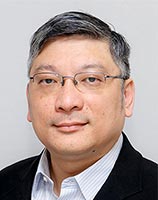Keynote Speaker I

Prof. Wai Ho Mow
IEEE Senior Member
The Hong Kong University of Science and Technology, HKASR, China
Keynote Lecture: TBA
Abstract: TBA
Biography: Wai Ho Mow received his PhD in Information Engineering from the Chinese University of Hong Kong in 1993. He was an Assistant Professor at the Nanyang Technological University, Singapore, during 1997-1999. He has been with the Hong Kong University of Science and Technology since 2000 and is currently a Professor. His research areas include wireless communications, display-camera communications, coding and information theory. He pioneered the lattice approach to signal detection, including universal lattice decoding and complex lattice reduction-aided detection. He gave a unified construction of all known perfect roots-of-unity (CAZAC) sequences, and such sequences (e.g. Zadoff-Chu sequences) have been widely used as communication preambles and radar signals. He published two books and co-authored 250+ journal/conference publications and is the inventor of 30+ patents. His joint work won the top prizes of 10+ project/paper competitions, including the 2014 HK U-21 IoT Gold Award for Revolutional Concept and the Best Mobile App Award at ACM MobiCom'2013. A novel picture-embedding 2D barcode, PiCode, developed by the HKUST Barcode Group under his leadership was highlighted as one of the four local innovations in the 2015 International IT Fest, a flagship event organized by the Office of Government Information Officer, Hong Kong. He was the general/program chair of six conferences, incl. SETA’2018@HK and was the Financial Chair of ISIT'2015@HK. He was the Chair and the founding Vice-Chair of the Hong Kong Chapter, IEEE Information Theory Society. He served on the editorial boards of seven journals, incl. the IEEE Transactions on Wireless Communications. He is a past member of the Radio Spectrum Advisory Committee, Office of the Telecommunications Authority of the Hong Kong S.A.R. Government.<Personal Webpage>
© CCISP 2016-2026. All rights reserved.